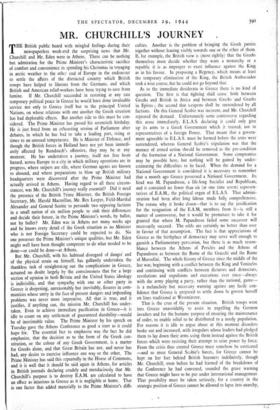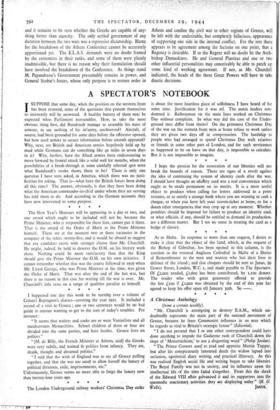MR. CHURCHILL'S JOURNEY .
THE British public heard with mingled feelings during their newspaperless week-end the surprising news that Mr. Churchill and Mr. Eden were in Athens. There can be nothing but admiration for the Prime Minister's characteristic sacrifice of comfort and convenience in spending his Christmas in voyaging in arctic weather to the °the:. end of Europe in the endeavour to settle the affairs of the distracted country which British troops have helped to liberate from the Germans, and which British and American relief-workers have been trying to save from famine. If Mr. Churchill succeeded in restoring at any rate temporary political peace in Greece he wou:d have done invaluable service not only to Greece itself but to the principal United Nations, on whose relations with one another the Greek situation has had deplorable effects. But another side to this must be con- sidered. The Prime Minister has passed his seventieth birthday. He is just freed from an exhausting session of Parliament after debates, in which he has had to take a leading part, rising at times to an unusual temperature. He is Minister of Defence, and though the British forces in Holland have not yet been immedi- ately affected by Rundstedt's offensive, they may be at any moment. He has undertaken a journey, itself not .free from hazard, across Europe to a city in which military operations are in progress, where snipers are rife, where German agents are known to abound, and where preparations to blow up British military headquarters were discovered after the Prime Minister had actually arrived in Athens. Having regard to all these circum- stances, was Mr. Churchill's journey really essential? Did it need the presence of the British Prime Minister, the British Foreign Secretary, Mr. Harold Macmillan, Mr. Rex Leeper, Field-Marshal Alexander and General Scobie to persuade two opposing factions in a small nation of six million people to sink their differences and decide their future, in the Prime Minister's words, by ballot, not by bullet? Mr. Eden was in Athens not many weeks ago and he knows every detail of the Greek situation as no Minister who is not Foreign Secretary could be expected to do. No one possesses the Prime Minister's unique qualities, but Mr. Eden might well have been thought competent to do what needed to be done—or could be done—at Athens.
But Mr. Churchill, with his habitual disregard of danger and of the physical strain on himself, has gallantly undertaken the thankless task of straightening out the complications in Greece, actuated no doubt largely by the consciousness that for a large section of opinion in both Britain and the United States ideology is indivisible, and that sympathy with one or other party in Greece is deepening, unreasonably but inevitably, fissures in com- munities whose unity in the face of present dangers and impending problems was never more imperative. All that is true, and it justifies, if anything can, the mission Mr. Churchill has under- taken. Even to achieve immediate pacification in Greece—it is idle to count on any settlement of guaranteed durability—would be of inestimable value. The Prime Minister by his speech on Tuesday gave the Athens Conference as good a start as it could hope for. The essential fact to emphasise was the fact he did emphasise, that the decision as to the form of the Greek con- stitution, or the colour of any Greek Government, is a matter for Greeks alone, and that Great Britain has not, and never has had, any desire to exercise influence one way or the other. The Prime Minister has said this repeatedly in the House of Commons, and it is well that it should be said again in Athens, for articles in British journals declaring crudely and mendaciously that Mr. Churchill's purpose is to destroy E.A.M. are calculated to have an effect as injurious in Greece as it is negligible at home. That is one factor that added materially to the Prime Minister's diffi- culties. Another is the problem of bringing the Greek parties together without leaning visibly towards one or the o:her of them. If, for example, the British view is (most rightly) that the Greeks themselves must decide whether they want a monarchy or a republic it is as improper to exert influence against the King as in his favour. In proposing a Regency, which means at least the temporary elimination of the King, the British Ambassador took a wise course, but he could not go beyond that.
As to the immediate desiderata in Greece there is no kind of question. The first is that lighting shall cease, both between Greeks and British in Attica and between Greeks and Greeks in Epirus ; the second that weapons shall be surrendered by all factions. On this General Scobie was insistent, and Mr. Churchill repeated the demand. Unfortunately some controversy regarding this arose immediately, E.L.A.S. declaring it could only give up its arms to a Greek Government which it trusted, not to representatives of a foreign Power. That meant that a govern- ment agreeable to E.L.A.S. must be formed before the arms were surrendered, whereas General Scobie's stipulation was that the menace of armed action should be removed as the pre-condition of the formation of a National Government. Some compromise may be possible here, but nothing will be gained by under- estimating the difficulties to be faced. When the demand for a National Government is considered it is necessary to remember that a month ago Greece possessed a National Government. Its head was M. Papandreou, a life-long Socialist and Republican, and it contained no fewer than six (at one time seven) represen- tatives of E.A.M., the political organ of E.L.A.S. That admini- stration had been after long labour made fully comprehensive. The reason why it broke down—that is to say the justification for the resignation of the E.A.M. members from it—is still a matter of controversy, but it would be premature to take it for granted that where M. Papandreou failed some successor will necessarily succeed. The odds are certainly no better than ever in favour of that assumption. The fact is that appreciations of Greece as the birthplace of democracy may serve well enough to garnish a Parliamentary perocation, but there is as much resem- blance between the Athens of Pericles and the Athens of Papandreou as between the Rome of the Gracchi and the Rome of Mussolini. The whole history of Greece since the middle of the last war, beginning with a conflict between the King and Venizelos and continuing with conflicts between dictators and democrats, revolutions and expulsions and executions ever since—always with the army playing a party, rather than the national, game— is a melancholy but necessary warning against any facile con- fidence that Greece is prepared to settle down to govern herself on lines traditional at Westminster.
That is the crux of the present situation. British troops went into Greece unavoidably to assist in expelling the German invaders and for the humane purpose of ensuring the maintenance of order, to enable relief to be distributed to a needy population. For reasons it is idle to argue about at this moment disorders broke out and increased, with irregulars whose leaders had pledged them to lay down their arms using them instead against the British forces which were resisting their attempt to seize power by force. From the crisis thus created Greece must somehow be extricated —and so must General Scobie's forces, for Greece cannot be kept on her feet behind British bayonets indefinitely, though Mr. Churchill, even before he had learned of the breakdown of the Conference he had convened, sounded the grave warning that Greece might have to be put under international management. That possibility must be taken seriously, for a country in the strategic position of Greece cannot be allowed to lapse into anarchy, • and it remains to be seen whether the Greeks are capable of any- thing better than anarchy. The only settled government of any duration between the two wars was a repressive dictatorship. Blame for the breakdown of the Athens Conference cannot be accurately apportioned yet. The E.L.A.S. demands were no doubt framed by the extremists in their ranks, and some of them were plainly inadmissible, but there is no reason why their formulation should have involved the breakdown of the Conference. As things stand M. Papandreou's Government presumably remains in power, and General Scobie's forces, whose only purpose is to restore order in Athens and confine the civil war to other regions of Greece, will be left with the undesirable, but completely fallacious, appearance of supporting one side in the internal conflict. For the rest there appears to be agreement among the factiois on one point, that a Regency is desirable. If so the Regent will no doubt be the Arch- bishop Damaskinos. He and General Plastiras and one or two other influential personalities may conceivably be able to patch up some kind of working agreement. If not, as Mr. Churchill indicated, the heads of the three Great Powers will have to take drastic decisions.



























 Previous page
Previous page